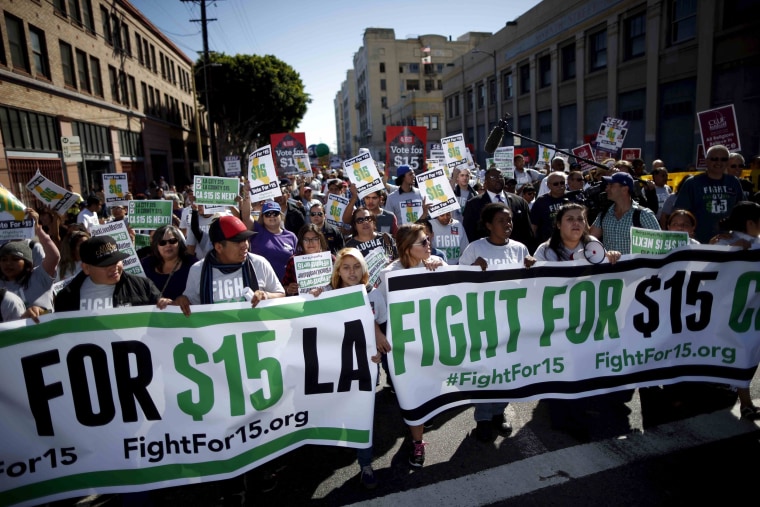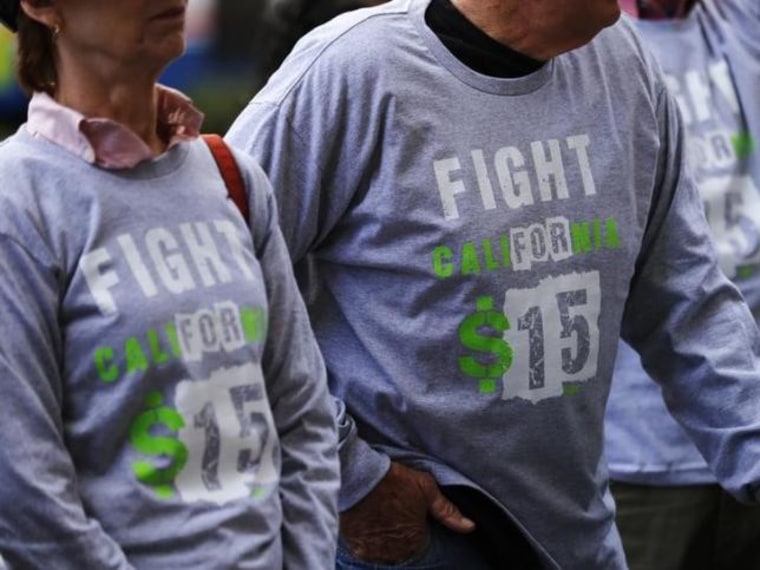In a political climate defined by stagnant wages for millions of workers, growing inequality and populist revolts in both parties, activists from outside of the political establishment and low-wage workers achieved a major victory on Monday when the Democratic governors of California and New York both signed bills that would gradually increase their states’ minimum wages to $15 per hour.
Politically, the minimum wages hikes were the culmination of a strong push from both labor unions and liberal activist groups, despite some reluctance from leading Democrats, to significantly raise the minimum wage in states. Republicans in Congress have blocked a nationwide increase.

In terms of economic policy, these two states will now be laboratories to explore if substantial hikes in the minimum wage help boost earnings for minimum-wage workers and spur raises for other employees at companies, as liberals argue, or if they result in companies cutting jobs, as conservatives say.
Neither state has enacted a bill that would simply make wages $15 per hour immediately, which would be more than double the current $7.25 federal minimum wage. New York’s minimum wage was $9 per hour. The provision signed by Gov. Andrew Cuomo will gradually increase wages in New York City to $15 per hour by the end of 2018 and in the counties surrounding New York City by 2021.
Wages will increase more slowly in the less expensive parts of the state, scheduled to reach $12.50 per hour by 2021 and $15 a few years after that.
California, which had a $10 minimum wage, will increase it statewide each year starting in 2017, until reaching $15 per hour in 2022. The governor of California, according to the law, can suspend the minimum wage increase if “seasonally adjusted statewide job growth for either the prior 3 or 6 months is negative and retail sales receipts for the prior 12 months is negative.”
About 2 million people in California currently are paid the minimum wage, according to the office of Gov. Jerry Brown.
Both states have lower requirements for small businesses.
“Congratulations to 10 million workers in CA and NY. The #FightFor15 won't quit until we all have $15 + union rights,” read a Twitter message from "Fight for 15," the group, backed by the Service Employees International Union, that has pushed for minimum wage hikes all over the country.

President Obama hailed the moves, as did his potential Democratic successors, Hillary Clinton and Bernie Sanders.
“Since I first called on Congress to increase the federal minimum wage in 2013, 18 states and more than 40 cities and counties have acted on their own -- thanks to the strong leadership of elected officials, businesses, and workers who organized and fought so hard for the economic security families deserve. Now Congress needs to act to raise the federal minimum wage and expand access to paid leave for all Americans,” Obama said in a statement.
Clinton joined Cuomo at a rally celebrating the new law.
The California Chamber of Commerce, an influential business group in the state, warned,“This unprecedented increase in the minimum wage will overwhelm many businesses that already are struggling with the current minimum wage increase and will limit job growth in this state.”
The passage of these two bills is a significant accomplishment for the “Fight for 15” movement. In his 2013 State of the Union address, Obama called for an increase of the minimum wage to $9 per hour. Now, two states, where a combined 59 million of America’s 320 million people live, have enacted much higher increases three years later.
The minimum hikes came after years of strikes by fast food workers in major cities across the country, as well as a push to get more moderate Democratic politicians, such as Cuomo, to embrace these provisions. While labor unions and liberal activists have made a $15 minimum wage nationally one of their core organizing principles, neither Clinton nor Obama has embraced this idea, although Sanders does.
The passage of these laws also illustrates the growing divide between red and blue states in an era when little is happening in Washington, because the president and Congress are from different parties. New York and California’s politics are dominated by Democrats, leading to the embrace of proposals like this minimum wage increase.
Meanwhile, states like Indiana and Utah have passed new restrictions on abortion rights in the last few weeks, while North Carolina, another GOP-controlled state, enacted a controversial provision that stops localities in the state from passing laws that specifically ban discrimination based on sexual orientation.